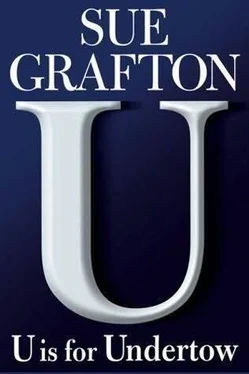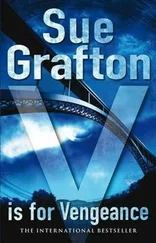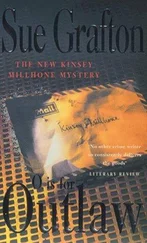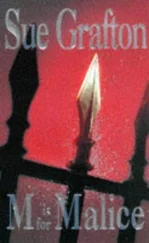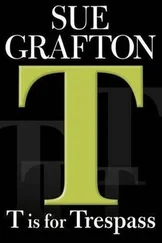“Shit. I love it. Schmerber Versus California. Is that all? Give me the rest of it. You’re bound to have more.”
“You’ll be charged with Penal Code 191.5-gross vehicular manslaughter while intoxicated. That carries four, six, or ten years, unless you have a prior, in which case it’s fifteen years to life.”
“Fuck.”
“When did you get a DUI?”
“Two years ago. Look it up. The date escapes me.”
“You’ll also be charged with VC-20001, subsection C-felony hit-and-run after a fatal DUI accident-”
“What are you talking about? What hit-and-run?”
“Yours. You left the scene. The cops found you half a mile away, trudging down the pass all by your lonesome. One shoe off and one shoe on. Remember the nursery rhyme? ‘Diddle diddle dumplin’, my son John, went to bed with his trousers on; one shoe off and the other shoe on…’ ”
Walker said, “Quit already. I know the one you mean.” He would have denied it, but he suffered a quick flash of himself stepping on a rock. He’d cussed and hopped on one foot, laughing at the pain.
Herschel continued in the same mild tone, his gaze fixed on Walker ’s. Walker wondered if it was malevolence he was seeing in his eyes, Herschel Rhodes’s long-awaited and oh-so-delicious revenge for past slights.
“You’ll also be charged with VC- 23153 A and B-DUI causing injury. If you’ve been convicted of a DUI within the past ten years, you could be charged with second-degree murder under the Watson case-”
“Shit on you, Herschel. I just got done telling you I have a fucking prior so why don’t you stick VC-23153 up your ass?”
“Have you talked to anyone else about this?”
“Just you and my wife. Believe me, that’s more than enough.”
Herschel leaned closer. “Because I have one piece of advice for you, pal: Keep your mouth shut. Don’t discuss this with anyone. If the subject comes up, you button your lip. You’re a deaf-mute. You no speaka da language. Are you hearing me?”
“Yes.”
“Good. The doctor’s talking about releasing you tomorrow morning-”
“So soon?”
“They need the bed. I’ll see if I can talk the cops into waiting until you’re home to take you into custody. Otherwise, they’ll arrest you right here, handcuff you to the rail, and post a cop outside the door. Whichever way it goes, remember these two words. Shut. Up.”
Walker shook his head, saying “Shit” under his breath.
“In the meantime, you’d be smart to put yourself in rehab, at least make a show of cleaning up your act.”
“I can’t go into rehab. I have a family to support.”
“AA, then. Three meetings a week minimum, daily if it comes down to it. I want you to look like a guy renouncing his sins and repenting his evil ways.”
“Are you going to get me out of this mess?”
“Probably not, but I’m the best hope you have,” Herschel said. “If it’s any comfort, you won’t go to trial for another three to six months. Speaking of which, I need a check.”
“How much?”
“Twenty grand for starters. Once we get to court, we’re talking twenty-five hundred dollars a day, plus the cost of expert witnesses.”
Walker kept his expression neutral, not wanting to give Herschel the satisfaction of seeing his dismay. “I’ll have to move money over from savings. I don’t keep cash like that in my checking account. Can it wait until I get out?”
“Have Carolyn take care of it. Nice seeing you.”
Monday, April 11, 1988
Peephole, California, is essentially two blocks long and ten blocks wide, a stone’s throw from the Pacific Ocean. A Southern Pacific Railroad track runs parallel to the 101, separating the town from the beach. A tunnel runs under both the train tracks and the highway, making it possible to reach the water if you’re willing to walk hunched over through a damp and moldy-smelling fifty yards of culvert. At the northernmost end of town there’s a banana farm. The only other businesses are a service station selling no-name gas and a fresh-produce stand that’s closed for most of the year.
I activated my left-turn signal and slowed, eyes pinned on the rearview mirror to make sure no one was plowing into me. At the first break in oncoming traffic, I turned off the highway and crossed the tracks, which put me at the midpoint, half the town to the right of me and half to the left. The ebb and flow of the surf and the surging and receding waves of cars on the highway created a hush of white noise. There was something lazy in the air. My driving tour was brief because there wasn’t much to see. The streets were narrow and there were no sidewalks. There were roughly 125 homes in a hodgepodge of architectural styles. Many of the original summer cottages still stood, probably tricked out by now with proper insulation, forced-air furnaces, air-conditioning units, and triple-glazed windows. These were people with storage problems. The yards I passed were littered with everything from boat hulls to broken birdbaths to old suitcases. Discarded furniture had been tossed off the porch steps, perhaps awaiting a sweep by the alley fairies.
I turned onto Zarina Avenue, checked the house number, and found myself peering at a one-story shingle-and-adobe house with a crudely constructed chimney piercing the roof on one end. A flaking white-painted picket fence staggered around the property, enclosing a length of gravel driveway bordered by patches of overgrown grass. A chicken-wire fence surrounded the vestiges of a garden planted in winter vegetables. A shaggy-coated yellow mongrel roused himself from a nap and sauntered in my direction, wagging his tail. The mop of hair hanging over his face made it look like he was watching me from behind a bush. This was the third dog I’d encountered in the past week, and I could feel my resistance fading. The dogs I’d met were a good-natured crew, and as long as none of them barked, snarled, snapped, bit, jumped on me, humped my leg, or slobbered o’ermuch, I was happy to make their acquaintance. This one followed me to the front door and watched expectantly as I knocked on the frame of the screen. He studied the door as I did, glancing at me now and then to show he was attentive to the plan and supportive of my aims.
The man who opened the door had to have been descended from one of the blue-eyed Irish-Hispanic clan who’d prospered in Peephole since the mid-1800s. His hair was the color of new bricks, clipped short and threaded with gray. He was tall and thin, broad-shouldered, with ropy muscles and a weathered nut-brown complexion that suggested hours in the sun. His jeans were well worn and rode low on his hips, and his blue denim shirt had a rip in one sleeve. I placed him at the north end of sixty.
“Yes?”
I said, “Sorry to bother you, but I’m looking for P. F. Sanchez.”
“That’s me. Who are you?”
“Kinsey Millhone,” I said. My impulse was to shake his hand, but that would have necessitated his opening the screen and I could tell he was already wondering if I was selling soap products door-to-door, while I was wondering if he was married. The Polk and the Haines hadn’t mentioned a spouse, and he wasn’t wearing a wedding ring. The cornflower blue of his eyes was the same shade as Henry’s.
“Mind if I ask what the P. F. stands for?”
“Placido Flannagan. People call me Flannagan, or sometimes Flan,” he said. “I have an uncle and two cousins named Placido, so I use my middle name.”
“So you’re Harry Flannagan’s, what, great-grandson?”
“Let me guess. You’re an amateur genealogist. That’s usually the story I get when a stranger asks about Harry.”
“Actually, I’m a private detective.”
Читать дальше
